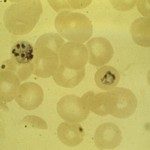Lien vers Pubmed [PMID] – 22538050
Lien vers HAL – pasteur-02008330
Lien DOI – 10.1016/j.mib.2012.04.001
Current Opinion in Microbiology, 2012, 15 (3), pp.285--291. ⟨10.1016/j.mib.2012.04.001⟩
Mosquitoes are the major arthropod vectors of human diseases such as malaria and viral encephalitis. However, each mosquito species does not transmit every pathogen, owing to reasons that include specific evolutionary histories, mosquito immune system structure, and ecology. Even a competent vector species for a pathogen displays a wide range of variation between individuals for pathogen susceptibility, and therefore efficiency of disease transmission. Understanding the molecular and genetic mechanisms that determine heterogeneities in transmission efficiency within a vector species could help elaborate new vector control strategies. This review discusses mechanisms of host-defense in Anopheles gambiae, and sources of genetic and ecological variation in the operation of these protective factors. Comparison is made between functional studies using Plasmodium or fungus, and we call attention to the limitations of generalizing gene phenotypes from experiments done in a single genetically simple colony.



